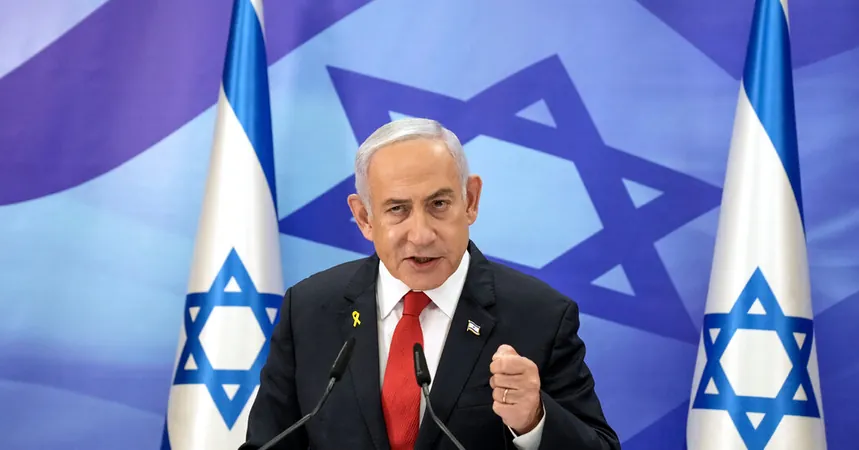
Netanyahu Promises Israeli Troop Presence in Contested Syrian Territory Amid Rising Tensions
2024-12-18
Author: Ling
Introduction
In a bold display of commitment to Israel's security, Prime Minister Benjamin Netanyahu visited military leaders near the newly acquired territory in Syria on Tuesday, asserting that Israeli troops will remain in the region for the foreseeable future. This visit, occurring just miles from the Israeli-held Golan Heights, signals an intensification of Israel's military involvement, which is likely to provoke a strong reaction from Syria's leadership.
Netanyahu's Statements
Standing atop Mount Hermon, Netanyahu emphasized the strategic importance of the location, declaring, “We will stay here until another arrangement ensures Israel's security.” His declaration comes as the Israeli military expands its reach following the destabilization of Syria, which has emboldened Israeli forces to push beyond traditional boundaries set after the 1967 Arab-Israeli war.
Historical Context
Reflecting on his past experiences, Netanyahu noted, “I was here 53 years ago as part of the Israel Defense Forces. The significance of this site for Israel's security has only increased.” He met with high-ranking military officials to assess current deployments and discussed future military strategies in this volatile area.
Defense Minister's Remarks
Following his visit, Defense Minister Israel Katz confirmed that they inspected positions on Mount Hermon, noting that maintaining control of this summit allows for improved surveillance of Hezbollah activities in eastern Lebanon. Katz asserted that the Israeli military would need to reinforce structures and prepare for a potentially long-term presence at the peak.
Geopolitical Ramifications
As tensions flare, the geopolitical ramifications are significant. The area has been a battleground of sorts, with Israel conducting airstrikes targeting Syrian military assets in an effort to dismantle military capabilities, including threats from Hezbollah and other militant groups operating within Syria’s borders. Recently highlighted is the new rebel faction in Syria, which emerged from a branch of Al-Qaeda, now attempting to reshape its image and assert control over Damascus while accusing Israel of breaching the 1974 armistice agreement.
Settlement Expansions
The Israeli advancement is not just limited to military presence; the government's approval of settlement expansions in the Golan Heights may double the local population and further complicate an already fraught situation. These actions place additional pressure on the Syrian rulers, who face multiple military fronts, including U.S. operations targeting ISIS and increased skirmishes between Turkish-backed forces and U.S.-allied Kurdish troops.
International Involvement
On the international stage, Russia remains a critical player. While it has historically supported Assad, recent statements from the Kremlin indicate uncertainty over the future of its military bases in Syria, leaving the door open for changing alliances.
Conclusion
As Israel’s actions draw scrutiny, the multiplicity of foreign interests underscores the complexities of the region, with Netanyahu's visit marking a determined stance amidst a landscape rife with instability. Will Israel’s escalating military presence lead to a new conflict or is there a roadmap toward future peace? The world watches closely as these dynamics unfold.

 Brasil (PT)
Brasil (PT)
 Canada (EN)
Canada (EN)
 Chile (ES)
Chile (ES)
 España (ES)
España (ES)
 France (FR)
France (FR)
 Hong Kong (EN)
Hong Kong (EN)
 Italia (IT)
Italia (IT)
 日本 (JA)
日本 (JA)
 Magyarország (HU)
Magyarország (HU)
 Norge (NO)
Norge (NO)
 Polska (PL)
Polska (PL)
 Schweiz (DE)
Schweiz (DE)
 Singapore (EN)
Singapore (EN)
 Sverige (SV)
Sverige (SV)
 Suomi (FI)
Suomi (FI)
 Türkiye (TR)
Türkiye (TR)